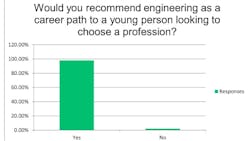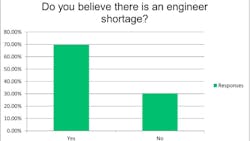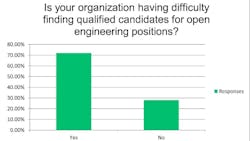Engineering is a Great Career. More People Should Get Into It.
Vision Systems Design Readers have delivered the verdict: Engineering is a satisfying career field with ample opportunity for challenge and advancement—but it needs new blood.
VSD’s editors asked our readers about this and other issues in the VSD’s 2024 Salary & Career survey. The survey contained some 25 questions; varying numbers of respondents answered each question.
For example, 88 (75.21%) of 117 respondents said they believe a career path in engineering and the potential for salary advancement is as promising today as it was five years ago. And nearly all (100 of 103, or 98%), who responded to the question of whether they would recommend engineering as a career path to a young person looking to choose a profession said they would.
“I would recommend engineering to a young person because of the potential to excel and get good paying jobs,” noted one respondent.
Another respondent pointed out that, not only are engineers always needed, but there is growing potential for start-ups, especially in areas that deal with or involve computer vision, computer graphics, and AI.
But a few caveats underpin the endorsement. One respondent suggested that newcomers to the field should specialize in areas that seem to especially need more engineers, such as machine vision. Another noted that engineering is not a career one should choose just for a perceived promise of stability and comfortable paycheck. Indeed, one should go into engineering “only if that person loves that type of work,” as it can be demanding and stressful.
See related content: Engineering Solid, Satisfying, Recommended Career Path
Is there a shortage of engineers?
According to the survey, of the 102 respondents who answered the question, 71 (69.61%) said they believe there is an engineer shortage. And of 100 respondents, 72 (72%) said their organization has difficulty finding qualified candidates for open engineering positions. Of 72 respondents, the top three sectors reporting difficulty finding qualified candidates were machine learning/AI (39, or 54.17%), software (37, or 51.39%). And systems engineering (28, or 38.89%).
Amanda Villareal works with Actalent (Hanover, MD, USA), a major engineering and science service and talent solutions firm. Villareal leads a recruitment team that specializes in manufacturing, mechanical quality, and field service engineering. This includes full-time permanent positions as well as long- and short-term contractor positions.
“I am definitely seeing that in the local market (Wisconsin, USA), but also hearing it across the whole country with all my colleagues, that there is a shortage out there,” Villareal says. She says her team largely works with companies seeking higher-level engineers.
Experience needs differ across the industry as well. According to the survey, of 100 respondents who answered questions regarding experience requirements, 54 (54%) said they require at least 3 years of experience for open jobs, 38 (38%) asked for at least 5 years of experience, 7 (7%) asked for at least 10 years of experience, and one asked for at least 15 years of experience.
So How Much Do Engineers Make?
The survey respondents seem to agree that engineering jobs are well-compensated. Indeed, the average salary of the eight respondents who disclosed their salaries in U.S. dollar amounts was around $109,000 per year. Expected salaries of 28 respondents who disclosed their expected salary ranged between $30,000 and more than $200,000. Of those 28, seven (25%) respondents reported that they expect to earn between $150,000 to $200,000 this year, five (17.86%) expect to earn between $100,000 to $124,999, and four (14.29%) expect to earn $80,000 to $89,000.
“Throughout my 33 years of employment, I have always enjoyed salary increment and bonus payout, except for a salary pay cut in 1998, no increment in 2020, and no bonus in 2021 during the pandemic,” noted one respondent.
Of 28 respondents, 10 (35.71%) said they expect to earn $10,000 or more in bonuses and 10 said they will not receive any bonus this year.
In-demand specialty areas such as machine learning and AI appear to be especially lucrative, several respondents said.
“Today, the demand is huge for the latest advanced software skills,” noted one respondent. “Hence, the salary advancement is more promising today than it was five years back.”
Is Money Everything?
Salary is obviously important. Of 99 respondents who rated factors that influence their job satisfaction, 22 (22.22%) said their compensation was important, 45 (45.45%) said it was very important, 24 (24.24%) said it was critically important.
But other factors do come into play. The ability to work on important projects and the opportunity to grow and learn are factors that contribute significantly to job satisfaction, say respondents.
Corporate culture and employee empowerment is an important aspect of the recruitment process, Villareal says. “By aligning the value of working with us and with our customers, we provide an employee value proposition as well,” she notes.
Are Engineering Firms Focusing on Employee Retention?
Responses to questions about employer retention efforts appear to be somewhat split. Of 120 respondents, 73 (60.83%) said they believe their company is as focused on employee retention as it was last year, while 47 (39.17%) said they did not believe their company was as focused on retention as it was last year.
Of 95 respondents, 49 (51.58%) said their company has never offered signing bonuses or incentives to new employees, and another 17 (17.89%) said their company used to but no longer offers incentives or hiring bonuses. Conversely, 18 (18.95%) said their company has always offered them, five (5.26%) said their company recently added them, and six (6.32%) said their company stopped offering them but recently reinstated them.
One hundred twenty-three respondents answered questions addressing hiring rates/activity of engineering firms/organizations. Of these, 38 respondents (30.89%) said hiring for new positions is on hold with their companies, 35 (28.46%) said their companies were increasing hiring activity, and 32 (26.02%) said there was no effect or change on the status of hiring and budget at their companies. Four (3.25%) reported their companies implemented furloughs, while 21 (17.07%) reported budget cuts in their company engineering .
Who Responded to the Survey?
Those who responded to VSD’s 2024 Career & Salary Survey tended to be experienced, full-time professionals with several years’ experience under their belts.
Respondents' ages ranged from 25 years old to over 60 years old. Eighteen of the 95 who disclosed this information (18.95%) identified as being 50-54 years old. Thirteen (13.68%) identified as being 30-34, 13 (13.68%) identified as being 45-49, and 14 (14.74%) identified as being 60 or older. Eleven respondents (11.58%) identified as being 55-59 years old, 10 (10.53%) 40-44 years old, nine (9.47%) 35-39 years old, and 7 (7.37%) 25-29 years old.
Most were based in Europe (34 of 100, or 34%) or the U.S. (27, or 27%), with another 11 (11%) in Asia and 10 (10%) in India. Of 117 respondents who reported their experience levels, the top three cohorts were those who had five to nine years’ experience (22, or 18.8%), followed by 20 to 24 years (16, or 13.68%), and 25-29 years (15, or 12.82%). Interestingly enough, the two smallest cohorts were at opposite poles of the spectrum. Five respondents (4.27%) reported having less than a year experience; five respondents (4.27%) reported having 40 years or more experience
One hundred twenty-eight (79%) of 162 respondents indicated they were employed full time with 16 (9.88%) identifying themselves as entrepreneurs or self-employed. Nine (5.56%) said they were employed part time, four (2.47%) said they were contract workers, and the remaining five (3.09%) were unemployed.
Nearly all—132 (90.41%) of 146—respondents indicated they were in the same job they held this time last year.
Forty-five (31.25%) of 144 respondents said they were in design and development engineering, the largest cohort of respondents that identified their principal job function; however, the respondents overall are involved in a variety of areas, including test and measurement, process engineering, civil engineering, mechanical design, and procurement engineering. Seventeen (11.81%) said they were in engineering management and another 25 (17.36%) said they were in executive or operating management. Governance, lecturing at a university, electrical installation design, and environmental engineering were job functions identified in the “other” general cohort category.
Finally, sixty-six of 145 respondents identified as holding executive or senior management level positions. Of these, 18 (12.41%) said they were president, owner, CEO, partner, or other executive management, while 27 (18.62%) said they were group leaders or project managers, 15 (10.34%) said they were department heads, and six (4.14%) said they were technical or engineering directors or managers.
About the Author
Jim Tatum
Senior Editor
VSD Senior Editor Jim Tatum has more than 25 years experience in print and digital journalism, covering business/industry/economic development issues, regional and local government/regulatory issues, and more. In 2019, he transitioned from newspapers to business media full time, joining VSD in 2023.




